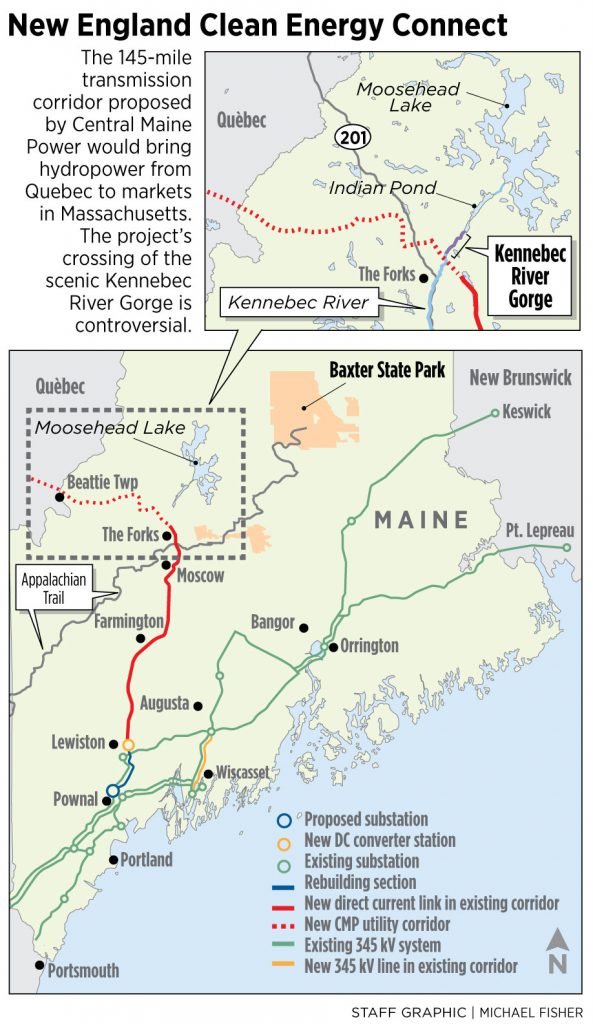LEWISTON — A group formed by business and labor leaders announced its support Tuesday for the transmission line proposal by Central Maine Power Co. that has drawn opposition from hundreds of residents and will go before state regulators for a final public hearing on Wednesday.
Known as New England Clean Energy Connect, the project would bring hydropower from Quebec to Massachusetts by stringing a new 145-mile transmission line through western Maine to a converter station in Lewiston. More than 400 comments have been submitted to regulators, who are scheduled to hold a public hearing on the project Wednesday. The volume is not a record – the University of Maine’s Aqua Ventus wind power project drew more than 600 comments – but is indicative of the broad interest generated by CMP’s plan.
Groups for and against the NECEC project have been using rallies, reports and endorsements to sway the three members of the Public Utilities Commission, who are scheduled to vote in late December on whether to issue a key permit.
A number of business and labor representatives assembled for a news conference Tuesday morning on Lincoln Street, where the “Mainers for Clean Energy Jobs” campaign kicked off. Ben Dudley, director of Mainers for Clean Energy Jobs, said the project will make Maine “a leader in the race against the catastrophic effects of climate change” by reducing carbon dioxide emissions by 265,000 metric tons annually.
Others, such as representatives from the Associated General Contractors of Maine, E.S. Boulos and Cianbro, argued it will produce 3,500 new jobs during peak construction.
Dana Connors, president of the Maine State Chamber of Commerce, said thousands of good-paying jobs would be created in “a section of our state that badly needs them, western Maine.”
The pro-power line rally took place on the eve the public hearing, set for 5 p.m. Wednesday at the PUC offices in Hallowell.
To build the project, CMP and its parent company, Avangrid, need to win a Certificate of Public Convenience and Necessity, which means they have to convince the commissioners that there’s a need for this new transmission line. To define “need,” the commission will consider factors that include financial harm to customers, economic impact, reliability and the specific route. These and other issues are being debated in complex, technical exchanges by lawyers and utility experts that so far have generated 391 separate filings in the case.

But the PUC also takes into account how customers feel. Wednesday’s public witness hearing invites members of the public to testify, and it allows all sworn testimony to become evidence in the case.
So far, public opposition has outweighed support.
At a first round of hearings in September in The Forks and Farmington, grass-roots organizers who live near the route and statewide environmental activists orchestrated a show of force. The overriding theme was that the project’s impact on the environment, natural resources and tourism outweighed promises of job creation and economic benefits.
At the PUC, the vast majority of the 411 comments so far are from people or groups against the project. One group which has filed multiple comments, Say No to 145-mile Transmission Line Through Maine, claims to have more than 4,000 members.
Local politicians and small towns along the route also are weighing in. The Forks, West Forks and Moose River have voted to oppose the project, and a handful of others are intervening in the PUC case.
On Sunday, Rep. Bradlee Thomas Farrin, R-Norridgewock, sent a letter to the PUC announcing his opposition.
The creation of a new coalition of workers and job creators is meant to remind the commissioners that there’s another side to the story, highlighting the promised benefits of thousands of construction jobs, millions of dollars in new tax revenue and cleaner power for the region.
The support of unionized electrical workers at the Lewiston event also is notable.
In New Hampshire, where the sidelined Northern Pass project was competing last year to build a similar transmission line from Quebec, the International Brotherhood of Electrical Workers negotiated a labor agreement that prioritized the hiring of workers from New Hampshire and Massachusetts. That was a way to assure that good-paying jobs would go to local residents.
Tux Turkel can be contacted at 791-6462 or
tturkel@pressherald.com
Twitter: TuxTurkel
Comments are no longer available on this story